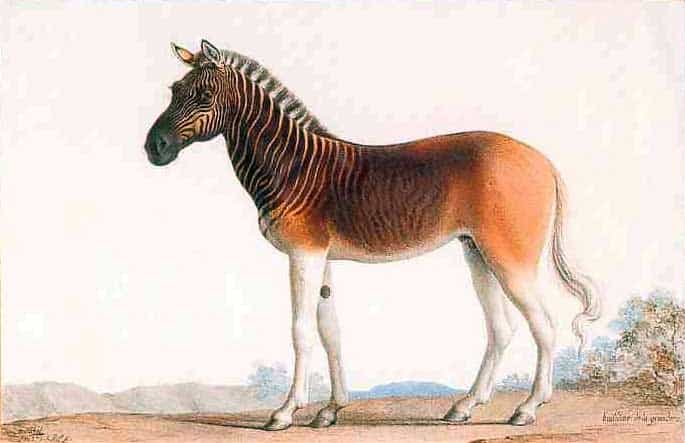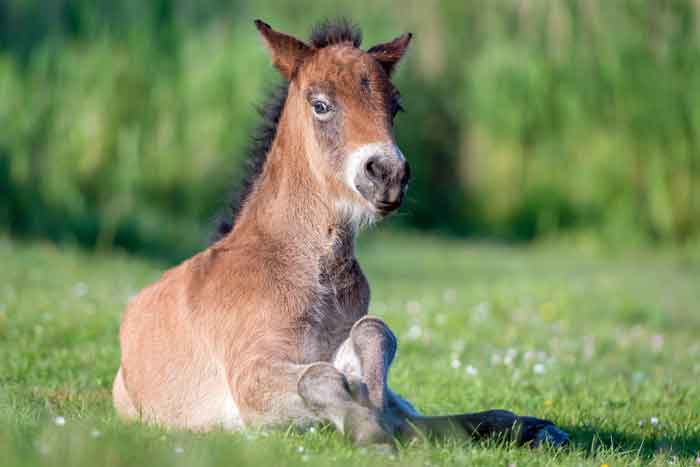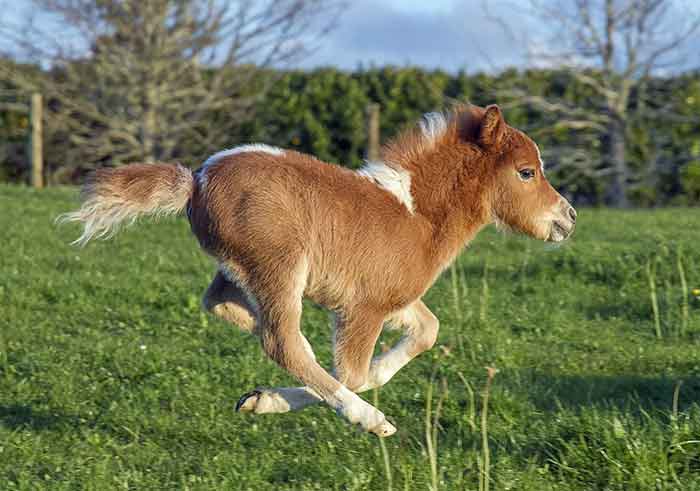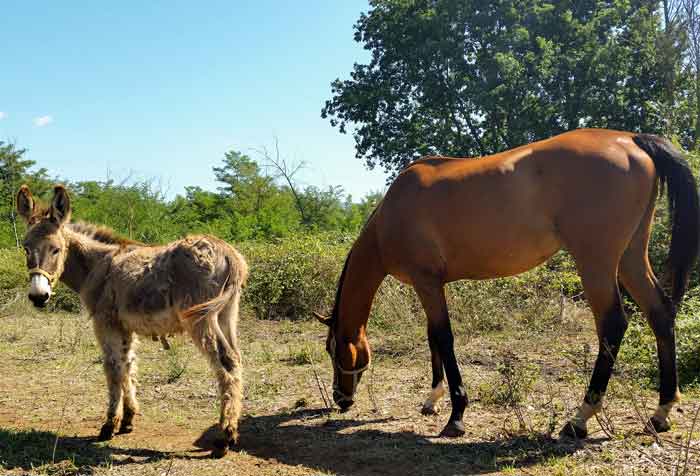Horses are amazing and beautiful creatures that are adored by many. Most, if not all, horses are domesticated and make great animal companions.
If you have always been interested in horses and have always wanted one of your very own and are considering taking the plunge and buying one, there are a few things that you have to ask yourself before you jump right in and buy a horse of your very own.
Below, I have compiled a list of very important questions that you should be asking yourself before you go out and buy a beautiful horse of your very own.
Table of Contents

1. How Much Can I Afford?
Like most things, the cost is very important when you are making any big decision, and buying a horse is a very big investment.
Buying a horse is a much larger commitment than just the initial cost of the horse. Reoccurring costs of horse ownership will depend on whether or not you intend to keep your horse on your property or board it at a facility.
Some potential costs of horse ownership include, but are not limited to:
- Food
- Bedding
- Boarding Costs
- Vet Visits
- Deworming and Vaccines
- Horse Shoes
- Hoove Trimmings
- Lessons on Riding or Training
- Horse Riding Equipment
- Horse Grooming Equipment
- Cost to Maintain your Barn
Horses are very expensive. They are closer in cost to babies instead of dogs and other pets. They eat tons of food and require other costs.
If you board your horse, they will often charge you monthly.
Even if you keep your horse at home, you will still have to pay to keep your horse fed, cleaned, and other expenses like electricity in the barn as well as barn upkeep.
You also need to be prepared for any surprise expenses that could occur for your horse.
2. Do I Have the Time for a Horse?
Horses require a lot of work and time, whether you are keeping them on your actual property or not.
Obviously, you will be taking on a bigger time commitment if you are keeping your horse on your property instead of boarding it. You will have to feed your horse and care for them twice a day, minimum. Not to mention checking to see if they are out of water.
Horses should have water 24 hours per day. You will also be responsible for the grooming and caring for your horses. Whether you board your horse or you keep it on your personal property, you will be responsible for making sure your horse gets enough exercise. Proper exercise is not only good for your horse’s health but also for their happiness.
Leaving a horse alone in the stall can make them miserable. Even if you board your horse, do not expect not to have to spend time taking care of it. Some places will take care of the feeding and cleaning of your horse, but it is not a guarantee.
You will want to make sure to check what all is offered when you sign up to leave your horse somewhere. Not only are you responsible for spending time taking care of your horse, but you will also need to make sure arrangements are made if you have to go out of town and will not be able to take proper care of your animal.
3. Do I Have Room For a Horse?
If you plan to board a horse at your home, you will need to consider if you have the room for a horse.
Horses need a lot of carefully manicured and open land if you plan to keep your horse at your house, and this only applies to the actual land and doesn’t even consider barns or facilities.
Horses need between one and a half to two acres of open land per horse.
Not only is this a requirement to make them happy, but depending on where you live, some places have a required amount of space before they authorize you to be able to own a horse.
4. Do I Have the Necessary Facilities?
You can always board your horse, but if you intend to keep your horse on your property, you will want to make sure that you have all the space and facilities that you need to properly take care of your horse.
Not only do you need a barn, stalls, and a pasture, but you also need a strong, sturdy fence and all the equipment that comes with taking care of a horse.
This equipment can include, but is not limited to:
- Grooming Equipment
- Stall Cleaning Equipment
- Riding Equipment
5. Do I Have the Necessary Experience to Care for a Horse?
Owning a horse requires a lot of know-how that a lot of people don’t have.
If you are uncertain whether or not you can work with and care for a horse, there are some steps that you can take.
To get practice in taking care of your horse, you can always volunteer to work in a stable to get the practical experience of what taking care of a horse will take. Just knowing how to ride your horse is not all the knowledge that you will need.
Properly feeding, grooming, and other care will be necessary when taking care of your horse.
If you think that just volunteering isn’t enough, you could also temporarily lease a horse so that you get a clearer idea of what owning a horse will be like.
6. Can I Handle a Horse?
Just knowing how to take care of a horse is not enough.
All horses are different and require different levels of care and handling. If you are not an experienced rider or trainer, you will have a hard time dealing with a younger and more spirited horse.
Training a horse can be very difficult, so if you are not ready to do so, you will want to get an older horse or one that is already trained. A young stallion is not going to be beginner-friendly.
You also don’t want a timid horse that will scare easily.
Having a realistic idea of what type of horse you are able to handle and will help when it comes time to pick out what horse you want.
If you do not feel confident about your riding or training abilities, you can always take riding lessons. It is recommended that you take lessons for at least six months before you start to handle your horse.
Not only will taking riding lessons to help you learn more about handling horses, but you will also be able to get connected to the horse community and can even establish a relationship with a professional who can help you if needed.
Buying a Horse:
If you have considered all the questions above, and you have decided you are ready to take the next step into horse ownership, there are a whole new set of questions that you need to consider about the horse itself.
If deciding to buy a horse is a big decision, then picking a horse is an even bigger decision.
7. How Old is the Horse?
As previously mentioned, age can be very important when it comes to picking out a horse. If you are highly experienced, you can go and get a young horse to train from scratch, but if not, you will want an adult horse or even an older horse.
If you get an older horse, it can be tough to only have him or her for a limited number of years, but it can be amazing to give an older horse a home, all while you get the hang of horse ownership.
8. Is the Horse in Good Health?
Health is a very important concern when you are buying a horse.
An unhealthy horse can cost you a lot of money in vet bills and specialized care. It is also possible that an unhealthy horse won’t be able to do all of the things that you want.
Some important things to ask the seller about the horse before you purchase in regards to its health can include:
- Has it ever been injured?
- Has it ever been ill?
- Is the horse up to date on all check-ups and vaccinations?
- Has the horse been regularly dewormed?
- Does the horse have any ongoing health conditions?
- Does the horse have any undiagnosed issues?
- Does the horse have any history of being abused or neglected?
Any of those questions could lead you to a red flag when it comes to the horse you are looking at.
A horse with previous health issues could lead to more issues and expenses down the road.
9. How is the Horse When it Comes to Riding?
Like questioning the age of the horse, you can also ask what rider level is needed.
This can help you to determine if you and the horse will be compatible when it comes to experience level.
Some ways to determine what experience level is needed for the horse is to ask the following:
- What level rider is needed for this horse?
- How often is this horse ridden?
- When was the last time this horse was ridden?
- Has this horse ever been shown?
- What is this horse best suited for?
- How is this horse when it is taken out?
- What does this horse do when they approach a natural obstacle?
- Does this horse behave well in traffic?
- Has this horse ever bucked, reared, or bolted in the past?
- What type of bit is used with this horse?
- Has this horse ever jumped?
- Is this horse used to riding alone or in a group?
- Who normally rides this horse?
- Who trained this horse?
- Did this horse have any training issues?
- Has this horse ever been ridden indoors?
- Does this horse need a special bit or saddle?
Getting the answers to the questions above can be a great indicator of what it will be like working and dealing with the horse that you are about to purchase.
Being well informed about the horse and its experiences can be a great way to tell if you will be a good fit and can help you in the future when it comes to working with the horse if you do purchase them.
10. What Type of Riding Do do You Want to do?
Not only do you have to decide what type of riding your horse is made for, but you also want to be sure about what type of riding is best for you.
If you intend to leisurely ride your horse around, then you will be looking at a different horse than if you intend to enter shows.
There are also different styles of riding to consider, like English or Western. Not only do these styles require different saddles, but there are many different types of riding that fit into these styles.
Don’t worry, you do not have to commit to one, and can decide later on which you would like.
11. What is the Horse’s Diet Like?
You can always look up what is best to feed a horse, but you might want to know more specific information about the horse you are looking at.
Asking about a horse’s current diet can not only inform you of what you might need to take care of him, but it can also help you to determine if the horse is properly taken care of.
When looking into the horse’s diet, you want to make sure you know what it eats and how much.
This will help you to know if it needs any special dietary needs or restrictions that you will have to accommodate if you choose to purchase it.
12. What Do you Need to Know in Regards to His Care?
Knowing how to care for the horse is also as important as knowing what to feed it.
Taking care of a horse is difficult enough, but it can be even harder if you do not know anything about their care history or preferences.
Some questions you can ask in regards to your horses care needs are:
- What is their living situation?
- Do they wear blankets?
- Have they ever been clipped?
- Have their teeth ever been floated?
- Are they easy to bathe?
- Are they allergic to anything?
- How large is their usual turnout space?
- Are they able to stand to have their mane braided or pulled?
- Are they good in new environments?
- What climate are they used to?
- How do they handle sprays for flies?
These are not the only things that you need to know when it comes to buying your horse but also when it comes to taking care of them later.
Another concern in a horse’s care is in regards to their hooves. Hooves are very important because horses spend the majority of their time on their feet.
You will want to know if they wear shoes if they have their hooves trimmed regularly, and whether or not they need specialized shoes.
13. Is the Horse Social?
Whether or not your horse is usually social can be very important, depending on what you are looking for.
Not only will you want to make sure your horse is good around people, which is a must, but you also will want to know how they do around other horses and even other animals. This can be very important if you own other livestock or even pets like dogs who will be interacting with your horse.
If they are not comfortable around other horses, it can be challenging to board them, as there will be other people and horses around all the time.
You also want to check and see if the horse will be comfortable and cooperative around children. This can be important if you have children, but also if you intend to ever have children around and interacting with your horse.
14. What Breed Am I Looking For?
Looking for a certain breed can be important to some people.
If you have a particular breed in mind, it might be harder for you to find what you are looking for.
If the breed is not as important to you, you might also consider what size horse you are looking for and go from there.
What size of horse you need can also help you narrow down the breeds that you are looking for.
15. Do I Want to Breed my Horse?
Whether or not you intend to breed your horse can be important. If you are looking to breed your horse, you will need to take a few things into consideration.
One thing to consider is whether or not you would like to have a female that you breed or a male that you lend out for breeding.
If you have a female, you will want to make sure that she can breed if she has been bred in the past either successfully or unsuccessfully, and whether or not she has any genetic issues that you need to know about.
16. Is There Anything Else I Need to Know?
Along with all this other stuff, you will want to ask some additional general-type questions from the seller.
You will want to know that the seller themself is reputable as well as the horse you are purchasing. Make sure before you work with a seller, you thoroughly research them and their legitimacy.
After you find a seller and before you purchase a horse, you will want to ask some of the following:
- How long have you owned the horse?
- What is the reason that you are selling the horse?
- Does this horse have any bad habits that I should know about?
- Is this horse more submissive or dominant?
- Are they friendly or shy?
- Do they have any personality quirks?
- What do you know about their history or where they are from?
- Has this horse ever been leased out, or do they have any previous owners?
This general questioning can lead you to any potential red flags and help you to officially decide if the horse is the right choice for you.
After asking all these questions, you should have a better idea if a horse is right for you.
Make sure that you ask everything you need before buying a horse. A horse is a long-term and expensive commitment that you do not want to make lightly.






